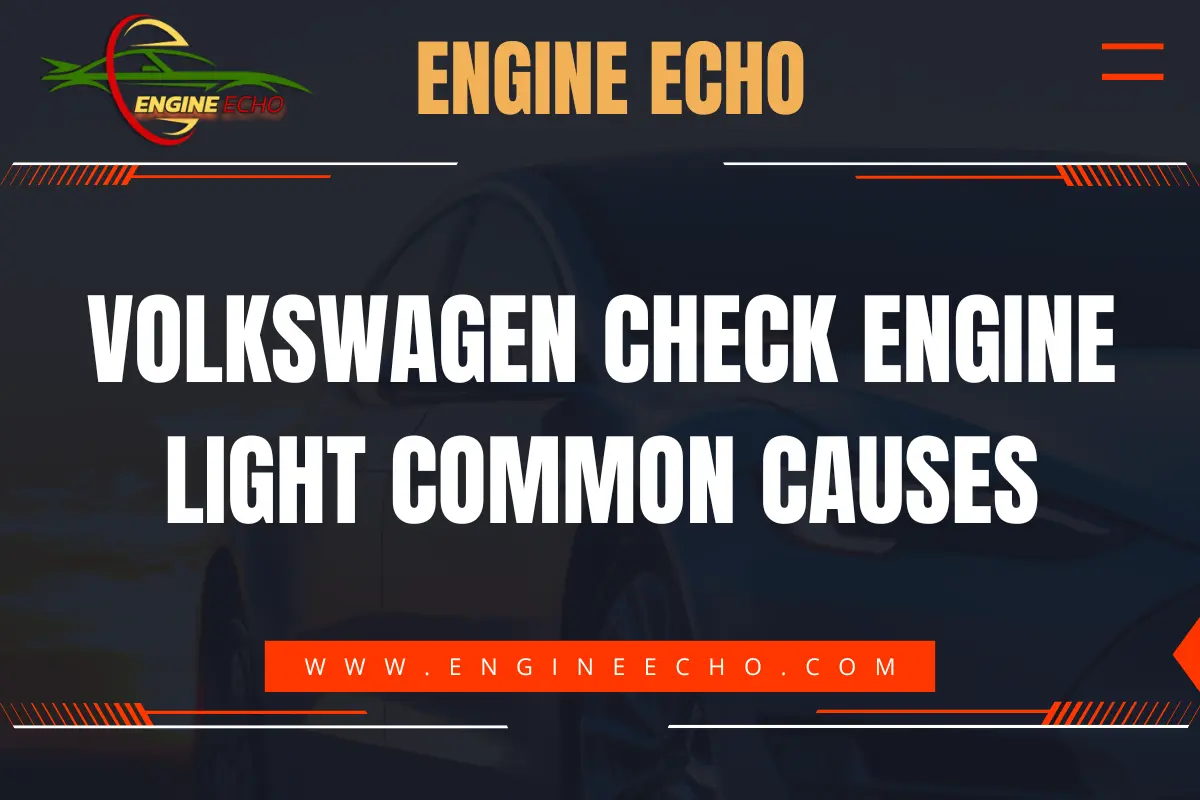Volkswagen Check Engine Light: Common Causes

Key Takeaways:
- The Volkswagen check engine light can indicate various issues, from minor problems like a loose gas cap to major engine faults.
- Oxygen sensor failure and catalytic converter problems are among the most frequent causes.
- Timely maintenance can prevent many check engine light triggers and extend the life of your vehicle.
- A diagnostic scan using an OBD-II scanner helps identify specific problems behind the check engine light.
- Ignoring the check engine light can lead to costlier repairs and impact overall vehicle performance.
Introduction
Let’s be honest—when that check engine light flickers on, it’s easy to hope it’s just a glitch. But that hope rarely lasts long once you dive into diagnostics. While ignoring the light and keeping on with your day might seem tempting, it’s often the start of something bigger. What may look like a small issue can quickly turn into a serious (and expensive) problem if left unchecked. Whether you’re driving a Jetta, Golf, or Passat, understanding why the light comes on and what to do about it can save you a lot of stress and money. In this guide, I’ll walk you through the common causes and solutions, so you can handle the situation with confidence.
Common Causes of the Volkswagen Check Engine Light
1. Oxygen (O2) Sensor Failure
The oxygen sensor quietly keeps things running smoothly by managing the air-fuel mixture in your car. But when it starts acting up, it can throw off your fuel efficiency, make your engine idle roughly, and even lead to bigger problems if ignored.
- Symptoms: Reduced fuel efficiency, rough engine performance, and irregular exhaust emissions.
- Solution: Replacing the faulty sensor is a straightforward fix and can prevent further damage down the line.
2. Loose or Faulty Gas Cap
I’ve been there—thinking my car had a major issue when the check engine light popped on, only to realize the gas cap was loose. It’s a relief, but it’s also a reminder that even small issues can trigger that light. The gas cap keeps your fuel system pressurized, and when it’s loose or damaged, you’ll hear about it.
- Symptoms: Fuel smell around the car, decreased fuel efficiency.
- Solution: Tightening or replacing the gas cap usually resolves this.
3. Catalytic Converter Issues
The catalytic converter does an important job by cutting down on harmful emissions. But when it starts to fail, your car might smell like rotten eggs, and that’s not something you can just shrug off.
- Symptoms: Reduced power, poor fuel economy, and the smell of rotten eggs from the exhaust.
- Solution: Sometimes, a cleaning will do, but in most cases, replacing the converter is necessary.
4. Faulty Mass Airflow (MAF) Sensor
The MAF sensor helps your car’s engine get the right amount of air, but when it’s malfunctioning, your car’s performance takes a hit. You’ll notice problems like poor acceleration or even engine stalling.
- Symptoms: Engine stalling, poor acceleration, and decreased fuel economy.
- Solution: A quick cleaning might solve the problem, but replacing the sensor is often needed.
5. Malfunctioning Spark Plugs or Ignition Coils
Spark plugs and ignition coils are the workhorses of your engine’s combustion process. When they’re not working right, the engine misfires, making it hard to start or run smoothly.
- Symptoms: Engine misfires, hard starts, rough idling.
- Solution: Swapping out the faulty spark plugs or coils will get your engine back to running like normal.
6. Vacuum Leak
Vacuum leaks can be sneaky, but they can mess with your car’s performance in a big way. The vacuum system controls many functions, and when there’s a leak, your engine may idle too high, or you might hear a strange hissing sound.
- Symptoms: High engine idle, hissing noises, engine misfires.
- Solution: Inspect the vacuum hoses and components to find and fix any leaks.
7. EGR Valve Issues
The EGR (Exhaust Gas Recirculation) valve helps reduce emissions, but when it’s not working properly, it can affect your engine’s performance.
- Symptoms: Poor fuel economy, engine knocking, increased emissions.
- Solution: Cleaning or replacing the EGR valve usually fixes the issue.
8. Transmission Issues
You might not think of the transmission when the check engine light comes on, but transmission problems can be the culprit. Slipping gears or delayed acceleration are common signs that something’s up.
- Symptoms: Delayed acceleration, slipping gears, rough shifting.
- Solution: Have your transmission checked and repaired by a professional to avoid long-term damage.
9. Exhaust Gas Recirculation (EGR) System Faults
If the EGR system isn’t doing its job, your car’s performance and emissions will take a hit. You might notice a drop in power or even see black smoke coming from the exhaust.
- Symptoms: Poor engine performance, black smoke from the exhaust.
- Solution: Find the specific EGR component that’s failing and repair or replace it.
10. Battery or Charging System Problems
A weak battery or failing alternator can also set off the check engine light, and it might cause other systems to malfunction.
- Symptoms: Dim headlights, slow cranking, battery warning light.
- Solution: Check your battery and alternator, and replace them if needed.
11. Wiring and Sensor Issues
With so many sensors in today’s cars, even a small wiring issue can cause big problems. Corroded connectors or faulty wires can lead to inaccurate readings or system failures.
- Solution: Inspect and replace any damaged wiring or sensors to keep your car running smoothly.
Diagnostic Tools and Methods
Whenever that check engine light pops up, my go-to tool is an OBD-II scanner. It’s a lifesaver when it comes to figuring out what’s wrong. Just plug it in, and it’ll give you the error codes that point you in the right direction.
- Steps:
- Connect the scanner to the OBD-II port under the dashboard.
- Retrieve the fault codes.
- Research the codes or consult a mechanic to understand what they mean.
Volkswagen’s diagnostic system is detailed and can give you a clear idea of what’s going on with your car.
Preventative Maintenance Tips
Staying on top of routine maintenance can help keep that check engine light from making an appearance. In my experience, it’s worth the time and effort to keep your car in check.
- Regularly check and replace the air filter, oil, and spark plugs.
- Make sure your gas cap is tight after every fill-up.
- Schedule regular diagnostics to catch potential issues early.
- Stick to Volkswagen’s recommended service intervals to avoid surprises.
What to Do When the Check Engine Light Comes On
When my check engine light came on the first time, I definitely panicked. But here’s a simple process to follow when it happens to you:
- Check the gas cap: This is the easiest fix and often the culprit.
- Monitor performance: If the car feels normal and the light isn’t blinking, you can take your time getting it checked out.
- Address blinking lights immediately: A flashing light means something serious is going on—pull over and get help right away.
Common Misconceptions About the Volkswagen Check Engine Light
- Myth: “It’s always an expensive repair.”
Fact: It’s often something simple, like a loose gas cap or faulty sensor. I’ve seen it plenty of times! - Myth: “You can ignore the check engine light if the car runs fine.”
Fact: Trust me, ignoring the light will only lead to bigger problems down the road.
Case Study: Real-World Examples of Volkswagen Check Engine Light Diagnoses
- Volkswagen Golf – Oxygen Sensor Failure
A friend’s Golf had the check engine light on due to a failed oxygen sensor. He noticed his fuel economy dropping, and after a quick diagnostic, we swapped out the sensor, and the problem was solved. - Volkswagen Jetta – Vacuum Leak
A buddy’s Jetta had rough idling and poor acceleration. The diagnostic showed a vacuum leak, and after fixing that, the car was running like new again.
Cost Analysis for Common Repairs
| Problem | Estimated Repair Cost |
|---|---|
| Oxygen Sensor Replacement | $150 – $300 |
| Catalytic Converter Replacement | $900 – $2,500 |
| Mass Airflow Sensor Replacement | $200 – $400 |
| Spark Plug Replacement | $100 – $200 |
Regular maintenance can help you avoid costly repairs, but if you catch problems early, you’ll save in the long run.
Volkswagen Models Most Prone to Check Engine Light Issues
In my experience, Volkswagens like the Jetta, Passat, and Golf tend to see the check engine light pop up more frequently. These models often deal with sensor or emission system issues, so it’s always a good idea to stay on top of maintenance.
The Role of Software Updates in Preventing Check Engine Light Activation
Volkswagen regularly releases software updates that help prevent unnecessary check engine light activations. Keeping your vehicle’s software up to date is an easy way to avoid false alarms and ensure everything is running smoothly.
When to Visit a Mechanic vs. DIY Repairs
When it comes to simple fixes like tightening the gas cap or changing a spark plug, doing it yourself can save time and money. But for more complicated issues, like catalytic converter failures or transmission problems, I’d recommend heading to the shop. It’s not worth risking bigger issues by trying to fix it yourself.
Conclusion
At the end of the day, the check engine light is your car’s way of saying, “Hey, something’s up!” Whether it’s a minor fix or a more serious problem, addressing the issue early can save you from bigger headaches (and bills) down the road. I wrote this guide because I’ve seen firsthand how overwhelming that light can be, but it doesn’t have to be. With the right tools and know-how, you can take control and keep your Volkswagen running smoothly.
Frequently Asked Questions (FAQs)
Q1: Can I drive with the check engine light on?
A: It depends. If the light is steady, you can usually drive to a mechanic, but if it’s flashing, pull over immediately and get help.
Q2: How often should I replace my Volkswagen’s oxygen sensor?
A: Oxygen sensors should typically be replaced every 60,000 to 90,000 miles.
Q3: Can a loose gas cap cause the check engine light to come on?
A: Yes, a loose or faulty gas cap can trigger the check engine light.
Q4: Is it expensive to fix a catalytic converter in a Volkswagen?
A: Catalytic converter repairs can range from $900 to over $2,500, depending on the model.
Q5: How can I reset the check engine light on my Volkswagen?
A: You can reset the light using an OBD-II scanner, but it’s important to fix the underlying issue first.
With a little knowledge and a bit of hands-on experience, dealing with your Volkswagen’s check engine light doesn’t have to be stressful. Stay on top of it, and your car will keep running at its best!
Thanks for checking out this article on EngineEcho.com! Hope you found this article: "Volkswagen Check Engine Light: Common Causes" helpful! If you liked it and want to dive into more car engine topics, head over to our homepage. There's always something new to discover in the world of engines. Enjoy your reading journey!
Check out our previous article: Check Engine Light in Volkswagen: What It Means






